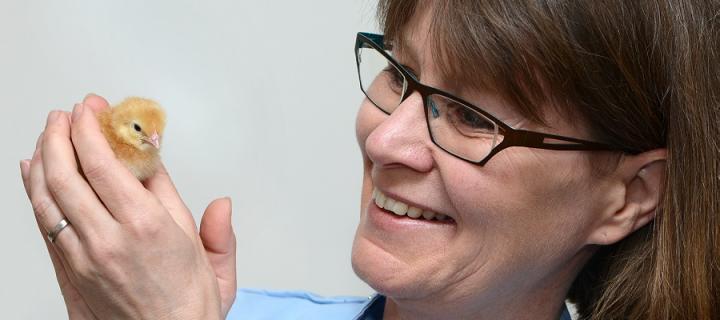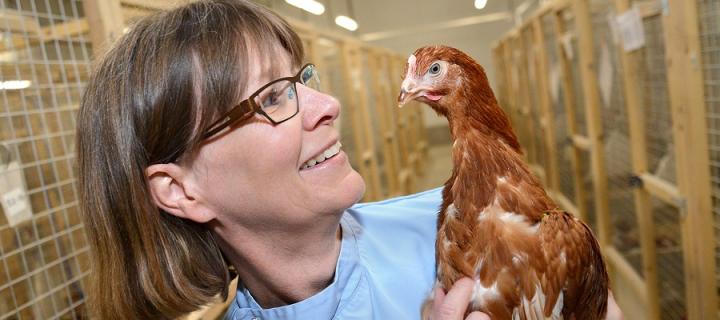Lonneke Vervelde and avian immunology
Lonneke Vervelde is based at The Roslin Institute, aiming to contribute to a more sustainable poultry industry.
What are you currently working on?

I try to unravel the chicken’s immune system with the ultimate goal to enhance immune-mediated resistance to pathogens and improve vaccine induced protection.
I am an avian immunologist and my group investigates basic immunological questions as well as more applied questions related to poultry health. The basic research is focussed on defining the phenotype, function and development of antigen presenting cells, the phenotype and function of naïve, effector and memory T cells, and innate mechanisms that drive adaptive responses.
The more applied research is focussed on the immune responses to pathogens and vaccines in poultry with the ultimate goal to enhance immune-mediated resistance and thus improving the welfare of the animals. The overall aim is to determine how the early innate responses modulate the adaptive responses and assess their role in the induction of protective immunity, particularly at mucosal surfaces. The research focuses on economically important pathogens such as avian influenza virus, infectious bronchitis virus, avian pathogenic E. coli and Eimeria.
What do you hope will come out of your research?
The efficiency and sustainability of agriculture needs to be increased significantly if we are to produce the amounts of food required to feed the increasing world population. These days the poultry industry is the dominant and fastest growing supplier of high quality and inexpensive animal protein worldwide.
I hope to unravel fundamental aspects of the chicken’s immune system, its unique features but also the similarities compared to the mammalian immune system. With that knowledge I wish to contribute to a more sustainable poultry industry through improved resistance to infection. I try to unravel how we can define a more robust chicken with a stronger immune system that can cope with the challenges in the field and how we can improve existing vaccines and develop novel vaccine strategies.
How did you get here?

I have been working in the field of avian (veterinary) immunology since the ’90s in the Netherlands and in the UK. After 15 years at the Vet schooI in the Netherlands I wanted to return to the UK because of the high standard of veterinary (avian) immunological research and the numerous opportunities to apply for grants in this field. I was asked to join The Roslin Institute in 2013.
The work I am currently doing is a continuation of the work I did in the Netherlands, but I now have access to great core funded infrastructures such as the bio-imaging facility at The Roslin Institute. I also have access to inbred chicken lines and genetically modified chickens available in the National Avian Research Facility at the Easter Bush campus. In addition, I am surrounded by many brilliant scientists who work on other aspects of chicken (and other farm animal) health, welfare and genetics.
Who are you collaborating with?
At the moment I am collaborating with other research institutes (UK, the Netherlands, German, France, USA, India) and universities (Denmark, Germany, Netherlands, USA), world leading pharmaceutical companies and poultry breeding companies.
Tell us something about you that might surprise us.
If I could stop working tomorrow I would start breeding and training Border Collies.

